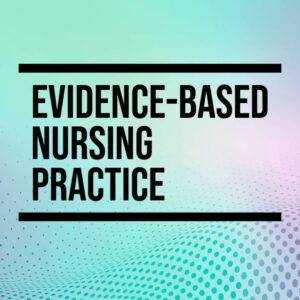Table of Contents
Evidence-Based Nursing Practice: Improving Patient Outcomes and Quality of Care

As healthcare professionals, nurses are committed to providing the best possible care to their patients. One way to achieve this is to incorporate evidence-based nursing practice (EBP) into their daily work. EBP is a problem-solving approach that uses the best available research to inform clinical decision-making and improve patient outcomes.
What is evidence-based practice?
EBP involves the continuous process of questioning, seeking, and evaluating the best available evidence, applying that evidence to clinical practice, and evaluating the results. It is a multidisciplinary approach where health professionals, patients, and researchers work together to identify and solve clinical problems. EBP is based on the premise that healthcare practices should be based on the best available evidence, not just tradition, intuition, or personal experience.
Benefits of Evidence-Based Nursing Practice
Incorporating EBP into nursing practice offers several benefits, including
Better patient outcomes: By using the best available evidence to inform clinical decisions, nurses can provide more effective and efficient care, resulting in improved patient outcomes.
Better patient safety: EBP helps identify and reduce errors and adverse events, improving patient safety.
Increased patient satisfaction: When patients receive treatment based on the best available evidence, they are more likely to be satisfied with their treatment experience.
Professional Growth: Participation in EBP helps nurses stay abreast of the latest research and development in their field, which contributes to their professional growth and development.
Increased efficiency: By using the best available evidence in practice, nurses can reduce unnecessary procedures and tests, improving efficiency and saving costs.
Implementing Evidence-Based Practice in Nursing
Implementing EBP in nursing involves several steps, including
Asking the clinical question: The first step in implementing EBP is to identify the clinical problem or question that needs to be addressed.
Finding Evidence: The next step is to look for the best available evidence to address a clinical question. This may involve searching databases such as PubMed, the Cochrane Library or CINAHL.
Evaluation of evidence: Once evidence is found, it is important to critically evaluate it to determine its quality and significance.
Implementation of evidence: Once evaluated, evidence can be applied to clinical practice to inform decisions and improve patient outcomes.
Evaluation of results: Finally, it is important to evaluate the results of an EBP intervention to determine its effectiveness and identify areas for improvement.
Conclusion
Evidence-based practice is an important part of nursing that provides a framework for providing high-quality, patient-centered care. By incorporating EBP into their daily practice, nurses can improve patient outcomes, increase patient satisfaction, and promote their professional growth. The EBP process requires ongoing commitment and collaboration, but the patient benefits make it worthwhile.
Evidence-Based Nursing FAQs
- What is evidence-based nursing?
Evidence-based nursing (EBN) is an approach to making clinical decisions that integrates the best available research evidence with clinical expertise and patient preferences and values. - What are the basic principles of evidence-based nursing?
The basic principles of EBN include staying up-to-date with the latest research and clinical practices, critically appraising the quality of research studies, considering patient preferences and values, and incorporating the best available evidence into clinical decision-making. - What are the types of evidence?
The types of evidence used in EBN can include research studies, systematic reviews, clinical practice guidelines, and expert opinions. - How can you use available evidence to improve patient care?
Using available evidence to improve patient care involves incorporating the best available evidence into daily clinical decision-making. This can involve staying up-to-date with the latest research and clinical practices, critically appraising the quality of research studies, and considering patient preferences and values. - How can you evaluate the effectiveness of your interventions?
Evaluating the effectiveness of interventions involves regularly assessing patient outcomes and measuring the impact of clinical decisions. This can involve using patient outcome measures, collecting patient feedback, and engaging in continuous quality improvement activities. - What are the potential barriers to using evidence in practice?
Potential barriers to using evidence in practice can include a lack of access to current research, limited time and resources, conflicting evidence, and a lack of understanding of research methodologies. - How can you identify when you need more or different evidence to make a decision?
Identifying when you need more or different evidence can involve critically evaluating the quality and relevance of the current evidence, considering patient preferences and values, and seeking out additional sources of information. - How do you transfer knowledge and skills learned in one context to another context?
Transferring knowledge and skills learned from one context to another can involve reflective practice, seeking out continuing education opportunities, and collaborating with colleagues and other healthcare professionals. - How do you respond when confronted with differences in interpretations of research findings?
When confronted with differences in interpretations of research findings, it’s important to critically evaluate the quality and relevance of the evidence, consider patient preferences and values, and seek out additional sources of information to make informed clinical decisions. - How do you maintain the passion for evidence-based nursing as a lifelong endeavor?
Maintaining the passion for EBN can involve staying up-to-date with the latest research and clinical practices, seeking out continuing education opportunities, engaging in reflective practice, and collaborating with colleagues and other healthcare professionals.
You May Also Like
Nursing Care Plan for Schizophrenia
Nursing Care Plan for Postpartum Hemorrhage